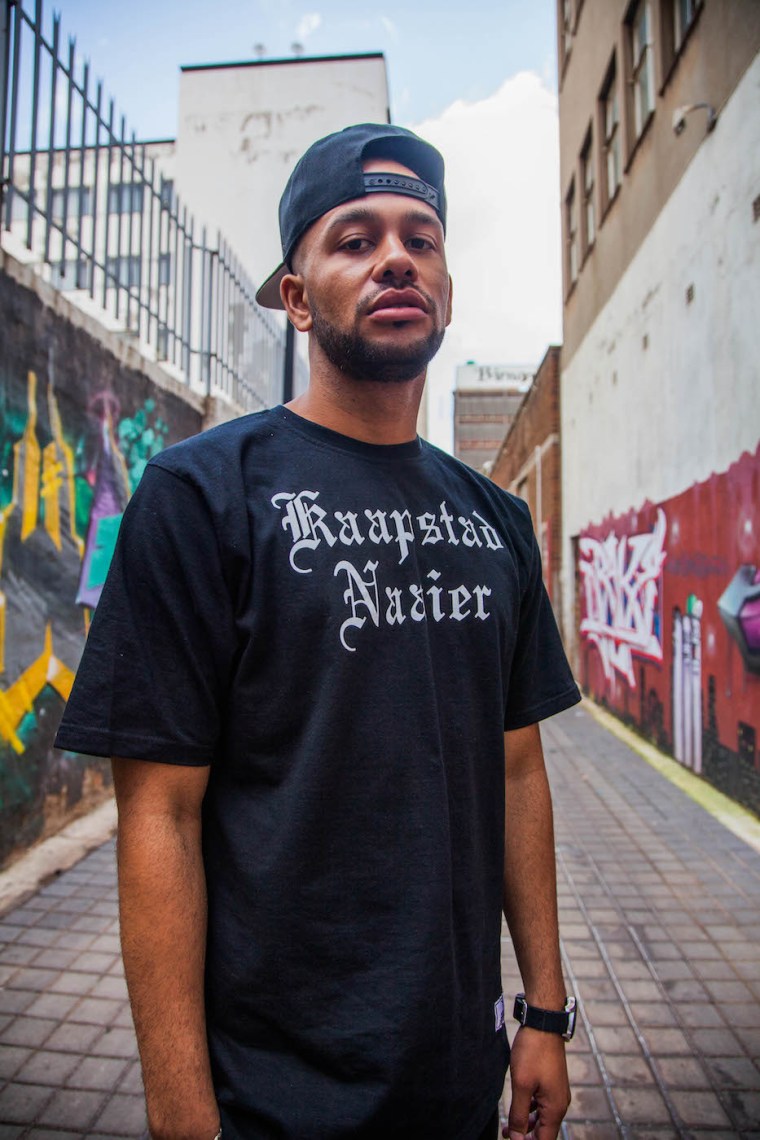
South African rapper YoungstaCPT’s debut solo album 3T has been years in the making. But the emcee knew he had to build his name before he was ready to release it. For years, he was releasing mixtapes — he has released 30 to date. Add several EPs, a few collaborative albums, countless music videos and a few tours to an already rich resume, and you have one of the most prolific rappers south of the Equator.
On “V.O.C,” one of the album’s singles, the 27-year-old declares himself “The Voice of the Cape.” That he is — he’s one of the few rappers from and based in Cape Town who are visible in South Africa’s mainstream hip-hop scene. And he raps about the issues he and the majority of Coloured people (a South African racial group with mixed ancestry including Khoisan, Afrikaner, English, and Easten Asian, among others) deal with in South Africa, especially in Cape Town where the country’s colonial history started in 1652.
With lines like, “I am not a lecturer, professor or a editor/ But a educator who’s been elected as the emperor/ The Mother City was pure till they corrupted her/ My people are the sufferers, so I’m running for governor,” on “V.O.C,” YoungstaCPT speaks to Cape Town’s colonial past and its effects on the Coloured people of Cape Town and what it could mean for the future.
YoungstaCPT’s music is an anomaly. He raps unapologetically in his Cape Coloured accent and vernacular — which is a mixture of Afrikaans, English and slang. His music videos are usually shot in the hood, showcasing the diversity of Coloured people and Cape Town, an image one doesn’t usually see on the country’s mainstream media platforms.
3T couldn’t have come at a better time. South Africa is going through a lot politically, and with his 22-track album, YoungstaCPT contextualizes the current political and social climate. He does that with the help of his grandfather, who he has conversations with on skits between most of the songs on the album.Sonically, the album blends the emcee’s influences, ranging from vintage American West Coast and East Coast beats alongside trap. Energetic chanty hooks and convincing delivery in his verses make for an exciting listen that doesn’t alienate its listener. Without any academic jargon and esoteric concepts, the rapperl manages to paint a vivid picture of life for one of South Africa’s previously disadvantaged groups that suffered from the apartheid government’s oppressive ways.
Recently, we talked to the emcee about his long and challenging journey to prominence, the meaning of some parts of 3T, his relationship with his grandfather, and more.
So in 2012, you released a mixtape titled Fr3eze Time. What was the thinking, because you have a song called “3T” on Fr3eze Time?
I would say that was the original 3T. I hooked up with Red Bull Studios. They were like, We want to make a project with you. Do you have anything? I was like, I have these tracks that I was working on for my album. This is just when [me, Reason and Tumi] did, “What Have You Done, My Brother?” So it was like 2012. I came [to Joburg]. Red Bull engineered and packaged the mixtape for us. I had my own team [of producers]; I had The Muffin Man, J Beatz, and Freezie. So there was definitely local producers, but it got that that corporate touch. For me, I needed to start legitimizing my mixtapes ‘cause my mixtapes was real mixtapes, it wasn't those mixtapes you could downloaded or mixtapes that came in a cover and shit, it was a CD with sleeve printed my name, website and all that kak. So that's how my mixtapes were looking up until Fr3eze Time. Fr3eze Time legitimized my mixtapes; it made my mixtapes look like a album.
So how did it feel to turn an album into a mixtape?
I didn't even think about it because, up until that point, the only experience I had had of albums was the independent album called Guy Fox (2011), which also didn't see the light of day really because we didn't invest in it, obviously because the funds was always non-existent. And the only reason I did that was because, after I made 12 mixtapes, people were like, Yo, you need to make a album now, you hot now, everyone knows you. And I'm just sitting there like, Guys, I don't think it's time yet. Everyone told me it was time. So I tried the album thing, it didn't work out exactly as I said it wouldn't. It didn't. Good songs on there. Two good songs came from that album, “Salute Ya” and “G-Spot.”

Why did you feel like including your grandfather on 3T?
Because there is no substitute for experience. I wasn’t close with my father, so I always got game from either other men like uncles and my mommy's boyfriends, my older cousins and Grandpa. But his advice, I always knew was gold. Your elders, when they speak to you, they say things that just rattle your fucking soul. You're like, Did you write this? Is this a fucking poem? What the fuck is this, my bruh? So, even the part where he talks about the lily at the end of the album, he didn't think about it. He just said it. And those are the kinds of gems I'm searching for as a young man. He always said things that I was like, I've been looking at it like that, or I didn't know it was like that, and he always spoke about his pops, he always spoke to me about how it was and what he had to overcome. I'm like Shit, people need to know this. People need to hear this.
You guys have been close.
Yes. I'm very proud to say that it's not something I did to gain fame or gain sales or try to sell people some dream or try to seek sympathy and pity, ‘cause I'm using an old man's story and he struggled. It's not that at all. Conceptualizing this album took me long. I watched exchange students come from America and film my grandfather in his house. You know what it was like for me to see that? ‘Cause I thought I knew it. I always knew his story was valuable. I knew this shit couldn't just have an effect on me because as soon as the foreign exchange students heard him speak, they asked, “Do you mind if we document it?”
What kind of person were you as a child to know all the things you know now and rap about?
I always had a higher knowledge of understanding. But my friends didn't have. How I knew this was because I saw how they interacted with one another, how they interacted with their families, how they interacted when we played outside, or played soccer. You pick up these behavioral things and you're like, I know better, I've learned better, I've done better, and then your friends pick it up in you as well. They are not stupid either. they [just] catch on kak, they not stupid. So they look at you, they're like, Hey, this motherfucker is different to us. Yeah, you don't do the same shit we do. You don't speak the same way we speak. You don't say the same shit we say. So one of two things happens: you either become a victim or they use you as an associate and a frame, and they keep you close instead of making you the victim. I've been both. So I always had a different understanding, but I think hip-hop has a lot to do with that. The lyricism, the wordplay, watching American movies like Friday, Training Day, and Boyz in the Hood. So, I'm watching these movies, and I'm thinking to myself, This shit reminds me of home, so now you start to see a picture, like this is like a mirror.
So that's where the West Coast influence and references in your music come from?
Yeah, because watching that shit, you’re seeing, okay, a bruh went to the shop to buy a lotto ticket. He gets shot in the alley, he has a new born baby. He had a scholarship and dies. I know that story.
Rappers who came from the era you came up in and were inspired by the golden era [of American hip-hop], it's always very difficult for them to be able to rap over trap beats as seamlessly as you do. How did you do it?
Growing up in Cape Town, you’re always around the alternative music, house and electro, so I jumped on that shit earlier on [in my career]. The tempos of music didn't really scare me that much because, with 30 mixtapes, you must have rapped over every kind of beat that exists. 30 mixtapes. So I think those mixtapes were also the prep work and the groundwork for me to maybe step onto the field and be like, Oh I can do this. I mean, “Way It Go,” you can ask Tumi and [DJ] Switch, I wrote that shit in 15 to 20 minutes. I actually made “Pose Like Stilo” and “Way It Go” on the same day.
On 3T, you have songs like “YVR” and “V.O.C” where you tell your story using apartheid imagery. What was going on through your head when you decided to flip those kinds of concepts?
The song “YAATIE,” that's me introducing you to Riyadh. Like, they need to meet Riyadh. They don't know who the fuck I am. So, that was number one. But if I'm going to take it to the start, I have to take it all the way back to the start. And the start is not apartheid. The start is colonialism, because colonialism opened the doors for slavery, and slavery opened the doors for apartheid to exist. If there wasn’t that, who knows how we would have been living? If you want to understand why the tree bends to the left, then look down at the fucking root and see how it grows, maybe it's growing into stones, maybe it's growing into the concrete. Maybe there's a rock there that's actually blocking it and preventing it from standing up straight. And also, I knew that the only way I was going to make people understand the situation in these ghettos like Grassy Park, Ottery, and Lotus River is take them right back to the start, and if I'm wrong, go do your own research.
You rap about a lot of ills on 3T, but you are not bitter, there’s a certain sense of hope in your rhymes. How do you manage to stay positive when things are the way you lay them down on the album?
Even though in the times that we’re living in it's hard to see the silver lining, I don't want people to think I was a bitter hateful rapper because many of us, like in our old age, especially the hip-hop ouens, they get painted with that brush: Oh, you didn't make it so now you're angry at the world. And I know one day people are gonna look back on this album and they're going to look back, and how do I want them to remember this?
